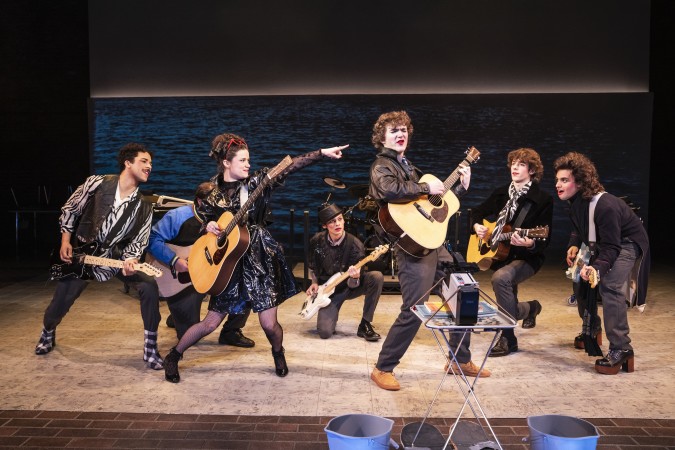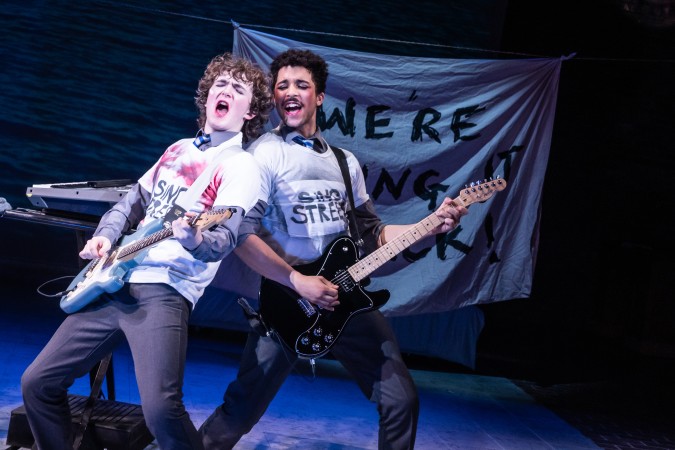Review: Enda Walsh/Rebecca Taichman's Indie Rocker SING STREET Mixes Anarchy and Empathy
If you're like this reviewer, you're a sucker for stories about young people loudly and aggressively voicing their rebellions through art. Three years ago, screenwriter/director John Carney's indie hit "Sing Street" told of a beaten-down 1980s Dublin teenage lad who forms a rock band initially to impress a girl, but then finds it as an outlet to write and perform songs expressing his range towards the adults who are supposed to be his role models. (Oh yeah, and he writes a song to try and make the girl like him, too.)

Brenock O'Connor, Brendan C. Callahan and
Gian Perez (Photo: Matthew Murphy)
Like a previous Carney film hit, "Once," playwright Enda Walsh has adapted the screenplay into a play with music that has a company of actor/musicians primarily singing songs in a realistic sense rather than living in a world where people sing as part of everyday communication.
The interesting difference is that in this lively and entertaining coming-of-age story, the raucous, back-beat infused original tunes by Carney and Gary Clark are performed alongside selections from the likes of Depeche Mode, Duran Duran and The Cure, allowing us to hear both the real-life music that influences the characters and the personal expressions they create.
As evidenced by the lovely Victorian seaside home the audience sees in miniature and as they enter New York Theatre Workshop (Bob Crowley designs the minimalist set and period costumes), the family of 15-year-old Conor (sweet and sympathetic Brenock O'Connor) has been accustomed to some of life's niceties.
But the opening sequence, the first of many vibrant visuals staged by director Rebecca Taichman, explains the current depressed state of the Irish economy, leading to a company wailing of Depeche Mode's "Just Can't Get Enough," played on a varied assortment of electric keyboards.
Conor's architect father (Billy Carter) announces economic compromises that include the boy's transfer from a fee-based school to getting a free education from Christian Brothers on Synge Street, named for playwright J.M. Synge (pronounced the same as you-know-what).
With the side of town where he lives indicating his status as posh, Conor becomes the target of tough kid Barry (Johnny Newcomb), who might actually be attracted to him, and is admonished by the arrogantly strict Brother Baxter (Martin Moran) for breaking the school's black shoes policy, though his family can't afford replacements for his brown shoes.
Immediately attracted to the cool and guarded Raphina (Zara Devlin), who says she's a model and has a boyfriend in his thirties, Conor gets her attention by saying his band needs a model for their new music video. All that's needed now is for his enterprising new friend Darren (Max William Bartos) to form a band and arrange a shoot.
Though Brother Baxter is initially supportive of the boys entering the Inner-City Dublin School Band Contest, his favor wains when they, influenced by Raphina, start wearing makeup.
Perhaps excited about being around kids her own age, Raphina drops her pseudo-sophisticated exterior a bit and, after being seduced by a song written especially for her ("You find a mystery bound in perfection / You've gotta read, but you don't wanna reach the end / Cos what if everything beautiful's fiction / And this reality's just pretend?"), gets involved with Conor (There's a gorgeously romantic visual of the two of them "under" the starlight."), but there are hints that there are serious secrets yet to be revealed.

(Photo: Matthew Murphy)
Unfortunately, not exploring them fully makes Raphina more of a trophy than a character. The main relationship of the musical turns out to be between Conor and his reclusive, sardonic older brother (excellent Gus Halper) who tries guiding him into living the life he cannot.
And there are moments that brilliantly show connections between Conor and the adults who are causing his stress. An argument between his parents has his exasperated father pounding on the kitchen table, which initiates the beat for his frenzied performance of "Girls", about the complexity of communication between sexes. Brother Baxter's private prayer is counterpointed by Conor's prayer for Raphina, "Dream For You."
And while Sing Street is a lot of fun when the company lets loose with adolescent fury, it's those personal connections and softer moments that bring out its whole-hearted warmth and uplifting optimism. A terrific mix of anarchy and empathy.
Reader Reviews


